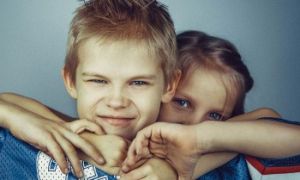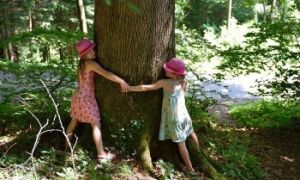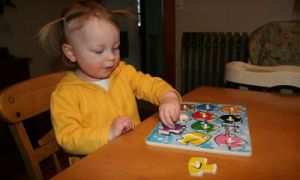At this age, preschoolers make big progress in gross motor skills such as running, jumping, balancing and climbing. Their movement becomes agile and more controlled and learning ability also begins to increase. This enables preschoolers to take part in a variety of activities.
Gross Motor Development Milestones
- walk backwards
- hop on one foot
- jumps forward
- walk up and down stairs (unassisted), using alternate feet
- does somersaults
- catches a ball with two hands
- begins to jump rope
- able to skip
- begins to gallop
- kicks a ball with control
- hops and stands on one foot up to 5 seconds
- goes upstairs and downstairs without support
- kicks ball forward
- throws ball overhand
- catches bounced ball most of the time
- moves forward and backward
- uses riding toys
- uses outdoor equipment confidently
- balances and walks across a narrow line
- skips on alternate feet
- begins to ride a two wheeler bike
- can easily throw, catch and kick a ball
- enjoys learning simple rhythm and movement routines
- dresses and undresses with little help
- hops, jumps and runs with ease
- climbs steps with alternating feet
- gallops and skips by leading with one foot
- transfers weight forward to throw ball
- attempts to catch ball with hands
- climbs playground equipment with increasing agility
- stands on one foot for 10 seconds or longer
- hops, somersaults
- swings, climbs
- may be able to skip
Preschoolers are much more confident with activities that involve gross motor skills. They are aware of their strength and balance and co-ordination are much greater. Preschoolers eagerly take part in games that encourage their kicking, catching and throwing skills and participating in positive playing experiences.


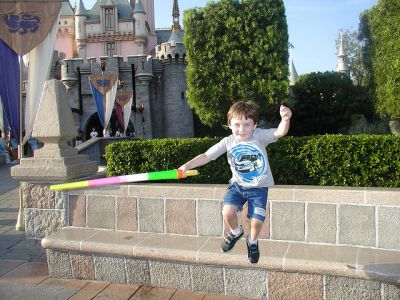
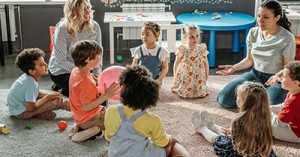
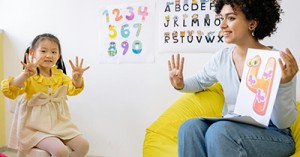
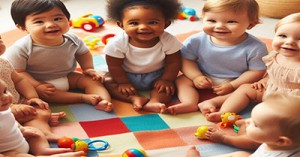

 Toddlers have a greater understanding of the world around them by this stage. Their cognitive development (also known as intellectual development and thinking skills) continues
Toddlers have a greater understanding of the world around them by this stage. Their cognitive development (also known as intellectual development and thinking skills) continues Infants begin to develop trust when parents begin to fulfil their needs. Such as changing an infant's nappy when needed, feeding on request and holding
Infants begin to develop trust when parents begin to fulfil their needs. Such as changing an infant's nappy when needed, feeding on request and holding Beginning at birth the construction of thought processes, such as memory, problem solving, exploration of objects etc, is an important part of an infant’s cognitive
Beginning at birth the construction of thought processes, such as memory, problem solving, exploration of objects etc, is an important part of an infant’s cognitive Toddlers want to do more on their own and do not like it when you begin to establish limits on their behaviour. Tantrums can become
Toddlers want to do more on their own and do not like it when you begin to establish limits on their behaviour. Tantrums can become Your preschooler is now able to focus their attention more accurately and is less influenced by distractions. The intensity of questions increase as your child
Your preschooler is now able to focus their attention more accurately and is less influenced by distractions. The intensity of questions increase as your child John Dewey is often seen as the proponent of learning by doing – rather than learning by passively receiving. He believed that each child was active,
John Dewey is often seen as the proponent of learning by doing – rather than learning by passively receiving. He believed that each child was active, Toddler advance and gains new skills in Gross Motor Development milestones achieved throughout earlier years. Co-ordination and challenges that could not be performed before such
Toddler advance and gains new skills in Gross Motor Development milestones achieved throughout earlier years. Co-ordination and challenges that could not be performed before such Erik Erikson developed a psychosocial theory to understand how we each develop our identities through eight stages of psychosocial development from infancy to adulthood. The
Erik Erikson developed a psychosocial theory to understand how we each develop our identities through eight stages of psychosocial development from infancy to adulthood. The At this point preschoolers begin to interact effectively with others. Play becomes more innovative and organized and “boyfriend” or “girlfriend” begins to emerge. Preschoolers have
At this point preschoolers begin to interact effectively with others. Play becomes more innovative and organized and “boyfriend” or “girlfriend” begins to emerge. Preschoolers have From now, babies begin to identify and respond to their own feelings, understanding other's feelings & needs and interact positively with others. A baby's social and
From now, babies begin to identify and respond to their own feelings, understanding other's feelings & needs and interact positively with others. A baby's social and